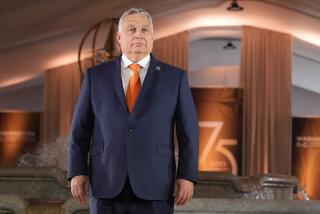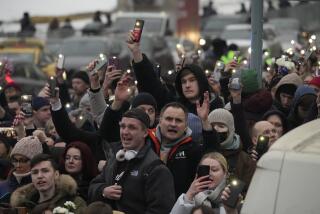Kremlin Bars Political Protests in Slap at Yeltsin : Soviet Union: The three-week ban blocks a rally for the Russian Federation leader.
- Share via
MOSCOW — The Soviet government Monday banned all political demonstrations in Moscow until mid-April to prevent backers of Russian Federation President Boris N. Yeltsin from holding a mass rally to support him in a showdown with Communist Party conservatives this week.
A government order, requested by President Mikhail S. Gorbachev, prohibited the “Let Us Defend Yeltsin” rally that had been planned for central Moscow, just outside the Kremlin, on Thursday when the Russian Congress of People’s Deputies begins a special session.
Yeltsin, a radical populist who commands more support than any other national politician and who has consequently emerged as Gorbachev’s principal rival, will face an attempt during the session by party conservatives to remove him as head of the Russian Federation, the largest Soviet republic.
In its order, the Cabinet directed the Soviet Interior Ministry and the KGB security police, as well as the Moscow city government, to take “all necessary measures” to maintain public order and ensure that there are no “rallies, pickets, street marches or demonstrations.”
The measure countermands the permit given earlier by Moscow Mayor Gavriil Popov for the rally, planned by the liberal political movement Democratic Russia, and the group’s next moves are uncertain.
Just as Democratic Russia had hoped to ensure victory in a vote of confidence for Yeltsin through a massive display of popular support, the government appears to have decided to seize the initiative and display its still strong powers by preventing the Yeltsin demonstration.
In force until April 15, the order also appears intended to prevent any popular protests against the government’s plans to double and even triple many food prices--on average, consumer goods will cost 60% more--as part of its economic reforms. The changes take effect next Tuesday.
Prime Minister Valentin S. Pavlov, who signed the order, said the measures are necessary to ensure “normal working conditions for conducting the Russian Congress of People’s Deputies.”
Pavlov ordered all companies, organizations, schools and research institutes in Moscow to maintain “strict state discipline, normal activity” throughout the capital.
He also instructed aviation and railway officials to take “concrete measures” to ensure transport security, presumably by preventing Democratic Russia from bringing thousands of supporters from other regions.
Twenty-nine conservative deputies had appealed to Gorbachev and Pavlov during the weekend to defend them against “aggressive elements,” saying they feared for their safety during the Congress because of “organized and tough pressure at their places of residence and near the venue of the Congress.”
As his own popularity continues to decline, Gorbachev has become increasingly critical about the “neo-Bolshevik tactics” of the radicals, accusing them of trying to force acceptance of their proposals through demonstrations and protests and, effectively, of trying to seize power in a way similar to that used by the Communists in 1917.
More than 200,000 people rallied on Feb. 24 and again on March 10 to support Yeltsin’s demand for Gorbachev’s resignation, and Democratic Russia hoped for at least twice that many on Thursday, although they chose a work day, not the usual Sunday, for their rally.
Yeltsin said last week that he would “appeal directly to the people” if conservative criticism became too strong at the Congress. His report on the political and economic situation in Russia, which covers half the Soviet Union, is the first major item on the agenda, and conservatives are expected to reply with a no-confidence motion.
A nationwide opinion poll released Monday showed that a substantial number of those surveyed believed that Yeltsin had a “better designed program of action” than Gorbachev to get the country out of its present crisis.
In a February survey, the National Public Opinion Studies Center found that among 2,263 people surveyed in a representative sample, 45% felt Yeltsin had a better program, compared to Gorbachev’s 19%. Thirty-six percent gave no definite answer, the center said, adding that the poll had a 3% margin of error.
Slightly more people, 36% vs. 32%, said they believed that Yeltsin, rather than Gorbachev, was more inclined to find a joint solution to the country’s problems.
The increasingly influential conservative parliamentary group Soyuz called on Gorbachev on Monday to convene an extraordinary session of the national Parliament to discuss the crisis in the country, contending that the draft union treaty, instead of laying a new political basis for the Soviet Union as a federal state, would actually accelerate its dismemberment.
More to Read
Sign up for Essential California
The most important California stories and recommendations in your inbox every morning.
You may occasionally receive promotional content from the Los Angeles Times.













